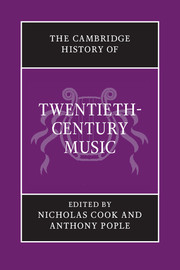Book contents
- Frontmatter
- Introduction: trajectories of twentieth-century music
- 1 Peripheries and interfaces: the Western impact on other music
- 2 Music of a century: museum culture and the politics of subsidy
- 3 Innovation and the avant-garde, 1900–20
- 4 Music, text and stage: the tradition of bourgeois tonality to the Second World War
- 5 Classic jazz to 1945
- 6 Flirting with the vernacular: America in Europe, 1900–45
- 7 Between the wars: traditions, modernisms, and the ‘little people from the suburbs’
- 8 Brave new worlds: experimentalism between the wars
- 9 Proclaiming the mainstream: Schoenberg, Berg, and Webern
- 10 Rewriting the past: classicisms of the inter-war period
- 11 Music of seriousness and commitment: the 1930s and beyond
- 12 Other mainstreams: light music and easy listening, 1920–70
- 13 New beginnings: the international avant-garde, 1945–62
- 14 Individualism and accessibility: the moderate mainstream, 1945–75
- 15 After swing: modern jazz and its impact
- 16 Music of the youth revolution: rock through the 1960s
- 17 Expanding horizons: the international avant-garde, 1962–75
- 18 To the millennium: music as twentieth-century commodity
- 19 Ageing of the new: the museum of musical modernism
- 20 (Post-)minimalisms 1970–2000: the search for a new mainstream
- 21 History and class consciousness: pop music towards 2000
- 22 ‘Art’ music in a cross-cultural context: the case of Africa
- Appendix 1 Personalia
- Appendix 2 Chronology
- Index
- References
Introduction: trajectories of twentieth-century music
Published online by Cambridge University Press: 28 March 2008
- Frontmatter
- Introduction: trajectories of twentieth-century music
- 1 Peripheries and interfaces: the Western impact on other music
- 2 Music of a century: museum culture and the politics of subsidy
- 3 Innovation and the avant-garde, 1900–20
- 4 Music, text and stage: the tradition of bourgeois tonality to the Second World War
- 5 Classic jazz to 1945
- 6 Flirting with the vernacular: America in Europe, 1900–45
- 7 Between the wars: traditions, modernisms, and the ‘little people from the suburbs’
- 8 Brave new worlds: experimentalism between the wars
- 9 Proclaiming the mainstream: Schoenberg, Berg, and Webern
- 10 Rewriting the past: classicisms of the inter-war period
- 11 Music of seriousness and commitment: the 1930s and beyond
- 12 Other mainstreams: light music and easy listening, 1920–70
- 13 New beginnings: the international avant-garde, 1945–62
- 14 Individualism and accessibility: the moderate mainstream, 1945–75
- 15 After swing: modern jazz and its impact
- 16 Music of the youth revolution: rock through the 1960s
- 17 Expanding horizons: the international avant-garde, 1962–75
- 18 To the millennium: music as twentieth-century commodity
- 19 Ageing of the new: the museum of musical modernism
- 20 (Post-)minimalisms 1970–2000: the search for a new mainstream
- 21 History and class consciousness: pop music towards 2000
- 22 ‘Art’ music in a cross-cultural context: the case of Africa
- Appendix 1 Personalia
- Appendix 2 Chronology
- Index
- References
Summary
We have not even begun to tell the history of twentieth-century music.
Susan McClaryThe Cambridge History of Twentieth-Century Music? What sort of a history of twentieth-century music might that be? The word ‘Cambridge’ is something more than a publisher’s imprint, for it locates this volume in a century-long tradition of Cambridge Histories and so emphasizes that this first large-scale, retrospective view of the twentieth century in music is a view from somewhere. As the title would lead you to expect, it is history written from a distinct and relatively homogeneous geographical, social, and cultural perspective: predominantly Anglo-American (though there are two authors from Germany and one each from South Africa and Australia), more male than female (gender representation in musicology, at least in the UK, remains far from equal), and white. That does not, of course, mean that our authors simply accept the traditional geographical, ethnic, and gender hierarchies of music history, for there is a strong revisionist strain in the book, one that attempts to contextualize and critique familiar narratives by juxtaposing them with alternative constructions of twentieth-century music. Like all historical writing, this Cambridge History is best understood as in essence a status report, a series of position statements in an ongoing dialogue, for no history can be more than a temporary stopping-point in a never-ending process of interpretation – which means that history is less a reflection of the facts than a construction of historians. What follows, then, is one particular set of constructions, the record of what a particular group of authors thought at a particular point in time.
- Type
- Chapter
- Information
- The Cambridge History of Twentieth-Century Music , pp. 1 - 17Publisher: Cambridge University PressPrint publication year: 2004
References
- 1
- Cited by



